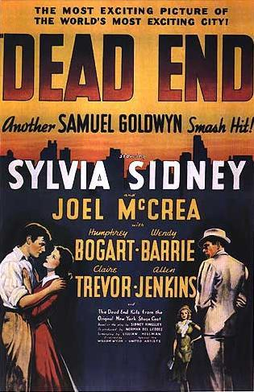
Dead End is a 1937 American crime drama film directed by William Wyler. It is an adaptation of the Sidney Kingsley 1935 Broadway play of the same name. It stars Sylvia Sidney, Joel McCrea, Humphrey Bogart, Wendy Barrie, and Claire Trevor. It was the first film appearance of the acting group known as the Dead End Kids.

The Gold Rush is a 1925 American silent comedy film written, produced, and directed by Charlie Chaplin. The film also stars Chaplin in his Little Tramp persona, Georgia Hale, Mack Swain, Tom Murray, Henry Bergman and Malcolm Waite.

Joel Albert McCrea was an American actor whose career spanned a wide variety of genres over almost five decades, including comedy, drama, romance, thrillers, adventures, and Westerns, for which he became best known.
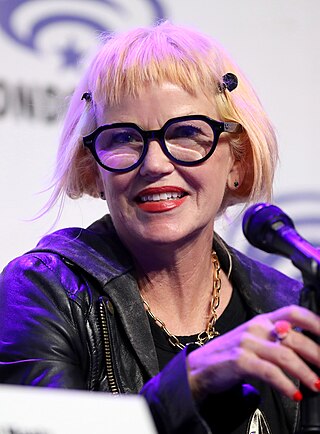
Kay Hanley is an American singer and songwriter. She is best known as the vocalist for the alternative rock band Letters to Cleo.

Black Bart is a 1948 American Western Technicolor film directed by George Sherman and starring Yvonne De Carlo, and Dan Duryea as the real-life stagecoach bandit Charles E. Boles, known as Black Bart. The movie was produced by Leonard Goldstein with a screenplay written by Luci Ward, Jack Natteford and William Bowers. The film, also known under the alternate title Black Bart, Highwayman, was released by Universal Pictures on March 3, 1948.

Eureka is an American science fiction television series that premiered on Sci-Fi Channel on July 18, 2006. The fifth and final season ended on July 16, 2012. The show is set in the fictional town of Eureka, Southern Oregon. Most residents of Eureka are scientific geniuses who work for Global Dynamics – an advanced research facility responsible for the development of nearly all major technological breakthroughs since its inception. Each episode featured a mysterious accidental or intentional misuse of technology, which the town sheriff, Jack Carter, dealt with, with the help of the town scientists. Each season also featured a larger story arc that concerned a particular major event or item.
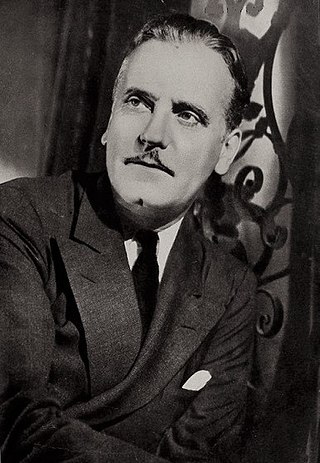
Raphael Kuhner Wuppermann, known professionally as Ralph Morgan, was a Hollywood stage and film character actor, and union activist. He was a brother of actor Frank Morgan as well as the father of actress Claudia Morgan.
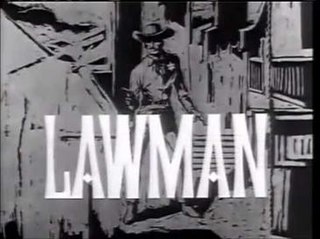
Lawman is an American Western television series originally telecast on ABC from 1958 to 1962, starring John Russell as Marshal Dan Troop and Peter Brown as Deputy Marshal Johnny McKay. The series was set in Laramie, Wyoming, during 1879 and the 1880s. Warner Bros. already had several Western series on the air at the time.
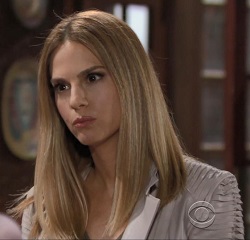
Mackenzie Browning is a fictional character from the CBS soap opera The Young and the Restless. The role was most recently portrayed by Kelly Kruger, who portrayed the role from February 19, 2002, to July 1, 2003, and from March 28, 2018, to January 11, 2019. Previously, the role was portrayed by Ashley Bashioum from 1999 to 2002 and 2004 to 2005, Nicole Tarantini temporarily in 2001, Rachel Kimsey from 2005 to 2006 and Clementine Ford from 2009 to 2010.
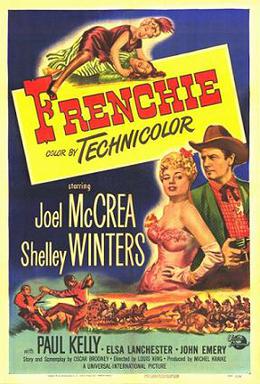
Frenchie is a 1950 American Western film directed by Louis King and starring Joel McCrea and Shelley Winters. The plot is loosely based on the 1939 Western Destry Rides Again.

The Group is the best-known novel of American writer Mary McCarthy. It made New York Times Best Seller list in 1963 and remained there for almost two years. In 1966, United Artists released a film adaptation of the novel directed by Sidney Lumet.
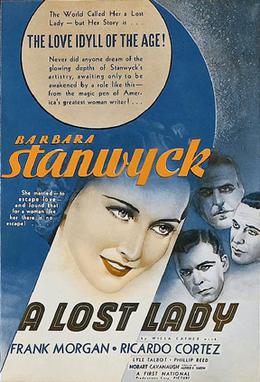
A Lost Lady is a 1934 American drama film directed by Alfred E. Green and starring Barbara Stanwyck, Frank Morgan, and Ricardo Cortez. Based on the 1923 novel A Lost Lady by Willa Cather, with a screenplay by Gene Markey and Kathryn Scola, the film is about a woman whose fiancé is murdered by his mistress' husband two days before their wedding. Her uncle sends her away to the mountains, where she meets a man who looks after her and eventually proposes. She accepts even though she does not love him.
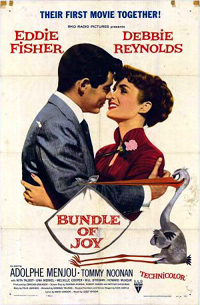
Bundle of Joy is a 1956 American Technicolor musical film directed by Norman Taurog and starring Eddie Fisher, Debbie Reynolds and Adolphe Menjou. It is a remake of the 1939 comedy film Bachelor Mother which starred Ginger Rogers and David Niven. Produced by Edmund Grainger, it was distributed by RKO Pictures. An unmarried salesgirl at a department store finds and takes care of an abandoned baby. Much confusion results when her co-workers assume the child is hers and that the father is the son of the store owner.

"Fall of the Hulks" is a 2010 comic book crossover storyline published by Marvel Comics. It ran throughout the ongoing Hulk and Incredible Hulk series, as well as a self-titled limited series; featuring the Hulk and various members of his supporting cast.
Elizabeth Wyckes, was the wife of Thomas Cromwell, Earl of Essex, and chief minister to Henry VIII of England. She was daughter to Henry Wyckes, a well-to-do clothier from Chertsey, and his wife Mercy, who married Sir John Pryor after Wyckes' death.

Our Little Girl is a 1935 American drama, in which Shirley Temple and Joel McCrea play the leading roles. The film was the final work of the veteran director, John S. Robertson.

Yellow Dust is a 1936 American Western film directed by Wallace Fox from a screenplay by Cyril Hume, John Twist, and John Francis Larkin. The film stars Richard Dix and Leila Hyams, with a supporting cast including Moroni Olsen, Jessie Ralph, Andy Clyde, and Onslow Stevens. RKO Radio Pictures premiered the film in New York City on February 22, 1936, with a nationwide release on March 13.
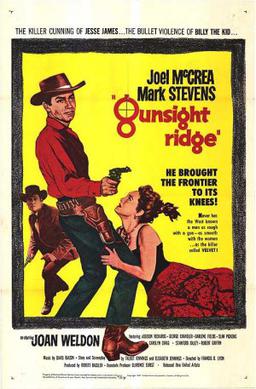
Gunsight Ridge is a 1957 American Western film directed by Francis D. Lyon and written by Talbot Jennings and Elisabeth Jennings. The film stars Joel McCrea, Mark Stevens, Joan Weldon, Addison Richards, Darlene Fields and Carolyn Craig. The film was released in September 1957, by United Artists.

















